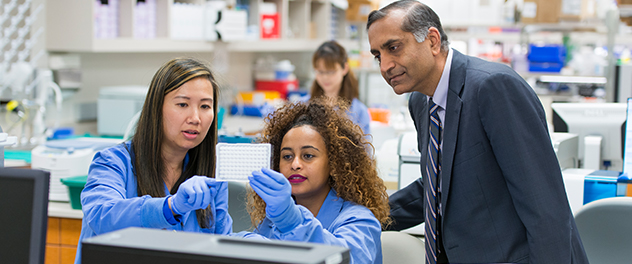 Novel discoveries in liver cancer
Novel discoveries in liver cancer
Our lab is investigating the mechanisms behind cancer and the response to cancer treatment to drive improvements in early detection and develop more-effective therapies for liver cancer and biliary cancer.
Overview
Research in the Molecular Hepatology Laboratory is driven by the desire to improve methods to detect cancer early and to develop better treatment for cancer.
Led by physician-scientist Tushar C. Patel, M.B., Ch.B., the Molecular Hepatology Lab focuses on liver epithelial cell biology, with an emphasis on the role and regulation of noncoding RNA genes in the pathogenesis of liver and biliary tract cancers. We also investigate the role of extracellular vesicles in liver function, cancer growth and response to treatment.
A current area of interest involves the cellular and molecular mechanisms by which dysregulation of cell survival signaling pathways contributes to disease pathogenesis in hepatobiliary cancers. One of the goals of Dr. Patel's Molecular Hepatology Laboratory is to understand these mechanisms and to use that knowledge to develop effective therapies for hepatobiliary cancers.
About Dr. Patel
Dr. Patel is a gastroenterologist (transplant hepatologist) at Mayo Clinic in Jacksonville, Florida, and a professor of cancer biology and a professor of medicine at the Mayo Clinic College of Medicine and Science. Dr. Patel is also dean of research at Mayo Clinic's Florida campus and is director of the Discovery and Translation Labs. Dr. Patel is board certified in internal medicine, gastroenterology and transplant hepatology.
Dr. Patel's clinical interests are in general and transplant hepatology, and his research focuses on the pathobiology and treatment of hepatobiliary cancers. He has received several research grants, including funding from the National Institutes of Health and has published extensively on liver cancer.